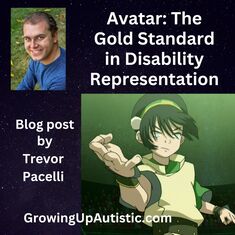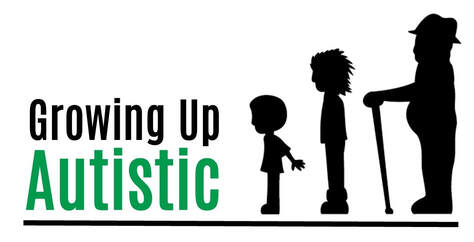 Similar to others my age, I watched Avatar: The Last Airbender on Nickelodeon as a kid. While I did enjoy the show, it wasn’t necessarily one of my favorite things to watch, not like SpongeBob SquarePants. Yet once I revisited the series on Netflix years later, I saw it with a new perspective I didn’t have when I was twelve. As a person with autism, I have come to greatly appreciate the cartoon world’s religion, politics, cultural differences, architecture, and philosophies in depths unheard of in entertainment for kids, or even for adults. I can now see how the show’s character with a disability parallels me and maybe others. Most shows for grownup audiences wouldn’t be mature enough to create an empowering character with a disability while also showing their weaknesses. In Avatar, Toph Beifong is a blind twelve-year-old girl who claims to be the world’s most powerful earthbender. She uses her bending abilities to feel the earth through her bare feet, which compensates for her disability by giving her a mental map through seismic vibrations of where everything is around her. As the series progresses, her earthbending only gets stronger, and she even invents metalbending by detecting the earth particles inside metal components, something no other earthbender could ever do. Since she grew up with parents who only saw her as weak and helpless because of her disability, they sheltered her from the world. They never allowed her to leave their house, so to get any semblance of the life she always needed, she had to secretly escape her parents. Because of her upbringing, Toph is fiercely determined to prove how capable she is. That means she refuses any help, and soon after joining the Avatar’s team, she intends to only look after herself without helping the others with various tasks like setting up camp. She believes that if she relies on anyone else or does anything to make herself look reliant on others, it makes her weak. It’s not until she has a talk over tea with the wise Uncle Iroh that she understands how needing one another is a basic human necessity. The rest of the series validates this point, as Toph is vulnerable in many locations because of her blindness. In the desert, the instability of the sand makes it difficult for her to form a mental map of her surroundings through her feet. She needs to cling to someone’s arm when at sea or riding on the Avatar’s flying bison, Appa--places she can’t feel the earth through her feet. In addition, because she’s blind, she can’t read, so people have to read things out loud to her. As an autistic person, I often feel similar struggles when others think little of me. I believe I must prove that I'm not just a dumb kid with a developmental disorder and that I can do whatever others without autism can do. So, if somebody asks me if I need help with something, or if I know what a certain word or phrase means, I get offended, because they wouldn’t ask that same question to someone without autism. However, there are some things I simply do need help with, more than most others my age. For example, my parents had to help me with securing a place to live and finding a job. Factors like home size, cost, location and renovations overwhelm me, and never really cross my mind. Even when I’ve moved in, I don’t ever think about making any kind of changes. I’m a simplistic take-it-or-leave-it kind of guy. I would certainly be lost if I didn’t have my parents guiding me through living on my own or getting a job. I’d probably be homeless by now. Likewise, plenty of others with mental or physical disabilities need extra help with certain tasks that those without disabilities don’t need help with. It sounds discouraging to know that at the age of thirty, some people will still be reliant on their parents. They may have to watch their peers and siblings enjoy far more freedom from mom and dad than they’ll ever get. Unfortunately, that’s just how things need to be at times. Some with disabilities are simply going to need this type of extra assistance their entire lives, just like Toph with her blindness. However, just like in Toph’s case, that dependency on others doesn’t make you weak, it just makes you human. Toph is mentioned in my book, What Movies Can Teach Us About Disabilities, as an example of strong disability representation I was exposed to as a kid, one that I at the time had taken for granted. I have also recently written the book, What Movies Can Teach Us About Bullying.
0 Comments
Leave a Reply. |
Inspiration for Life with AutismThis blog has a variety of articles about people living life with autism, and topics and ideas that can help in the journey. Guest bloggers are welcome. Inspired by Trevor, a young adult film critic, photographer and college graduate on the autism spectrum. Categories
All
Archives
July 2024
|
Proudly powered by Weebly

 RSS Feed
RSS Feed